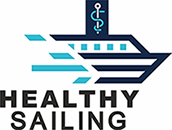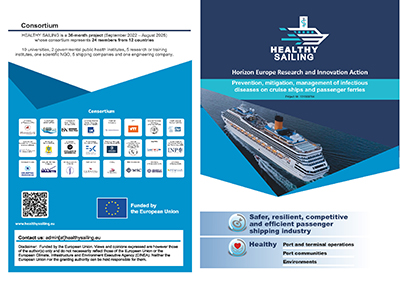General objective – Aim
HEALTHY SAILING aims to contribute to improving the quality of passenger shipping services brought to society, facilitating recovery from the COVID-19 pandemic, and making the passenger shipping sector safer, more resilient, competitive and efficient.
A consortium of 24 partners with vast experience and in-depth knowledge will produce evidence for infection control on large passenger ships, validate measures introduced for infectious disease prevention/mitigation/management, and develop training for use in ship operations and policymaking. Together, the implementation of these actions will work to reduce the occurrence of public health incidents on board large passenger ships.
Measures for prevention, mitigation and management will be innovative, multi-layered, risk and evidence-based, cost effective and tested. Considering the specificities and needs of different ship types, sizes and destinations, the measures introduced will be differentiated for large ferries, cruise ships and expedition vessels.
Overview of HEALTHY SAILING outputs and infectious disease prevention, mitigation and management measures
HEALTHY SAILING’S SPECIFIC OBJECTIVES
SO1 to establish a comprehensive scientific basis concerning the specific mechanisms facilitating the on board spread of infection and the effectiveness of different mitigation methods. In the framework of Work Package 3, literature reviews and epidemiological studies, risk assessment analysis and mathematical modelling for infectious diseases spread prediction will be conducted. A validated modelling capability to predict the dispersion of respiratory droplets and aerosols will be provided within the ventilated environment of a passenger ship, to be used for prevention/mitigation/management strategies. This comprehensive scientific basis will be publicly available (through Work Packages 2 and 7). Measures will be in place to facilitate the take-up of project outputs as a function of ship type, size, type of cruise and cruise destination.
Current needs/gaps
- Lack of evidence to inform guidelines and policies, while infection risks are not part of the current ship maritime systems for risk assessment processes.
- COVID-19 and other infectious disease spread dynamics on large passenger ships are not documented.
- No evidence is available for specific needs of port capacities related to public health response, or for interoperability of response plans between ships and ports.
Proposed solution: Multi-method evidence accumulation
- Epidemiological studies collecting and/or using data from cruise lines and authorities to identify evidence for mechanisms facilitating the spread of infection and mitigation measures.
- Systematic literature reviews to generate data identifying evidence for mechanisms facilitating the spread of infection and mitigation measures.
- Surveys and data collection to explore capacities and interaction of ships with land-based operations.
- Interventional studies to assess the impact of introduced measures, the level of understanding and the level of implementation by crew members.
- Surveys and literature reviews regarding occupational health and best occupational practices.
- An intervention study on a cruise ship to assess the feasibility, perception, frequency and type of medical consultations on board.
- An intervention study on board passengers ships for development of a technology induced behavioural change in hand hygiene management toolkit.
- Validation of pilot-runs and demonstrations of introduced technological solutions.
- Prediction of droplet and aerosol dispersion using computational modelling and probabilities for infection spread in various ventilation system modes, in relation to mask wearing and other measures.
- Prediction of the spread of COVID-19 and Norovirus using mathematical modelling.
- Risk communication principles for citizens, workers, stakeholders and the travelling public to contribute to the right perception of risks during ship voyages.
SO2 Develop, test and validate measures for early threat detection and for effective prevention/mitigation/management measures that can reduce the rapid spread of diseases and the infection risks on board large passenger ships, using syndromic surveillance for infectious diseases, innovative technologies including artificial intelligence (AI) and machine learning which are interoperable with legal, safety, security, environmental and other ship operational aspects and in the context of SSH aspects.
Current needs/gaps
- No systematic syndromic surveillance for infectious diseases on board passenger ships to enable detection of trends from known/unknown future emerging diseases.
- No standardized approach for response to infectious diseases on board passenger ships.
- Crowding of persons at terminals and on passenger ships is not easily controlled.
- Challenges exist for verification of vaccination certificates and laboratory tests at pre-embarkation.
- No means exist to validate effective surface cleaning conducted on board passenger ships.
- Lack of effectiveness of Water Safety Plans and no standardized methodology for decision-making as part of the risk assessment and characterization process.
Proposed solution: Multi-layered prevention, mitigation and management measures addressing known infections and preparing for future unknown emergencies
- Design, development and testing of a syndromic surveillance system for infectious diseases for large passenger ships
- Development of an IT prototype of an integrated health e-surveillance IT system (E-SS) for infectious diseases, to efficiently perform real-time syndromic, laboratory and environmental health surveillance.
- Development of an IT prototype of an Artificial Intelligence (AI) Intelligence Immune System (IIS) for health threat alerts combines data from E-SS, existing ship monitoring systems and epidemiological incidence rates from ship origins/destinations; supports health measures decision-making using artificial intelligence and machine learning; monitors health measures implementation.
- Development of an inventory of fast diagnostic laboratory methods including safe and reliable self-specimen collection protocols for crew and passengers.
- Interventional study to assess the impact of facilitated, free of charge medical consultation in encouraging reporting of symptoms.
- Establishing the framework for an international scientific committee for infectious diseases related to passenger ships, to exchange best practices and harmonize practices globally for proportionate public health response measures.
- Development of a toolkit for prediction of port response capacity needs for health response and interoperability of port and ship contingency plans.
- Development of an integrated e-pass based on one-ID concept (based on RFID enabled bracelets/cards and the related readers) to facilitate crowd control during embarkation/on board the ship and provide contact tracing functionalities
- Development of a toolkit for systematic monitoring of surface cleaning and disinfection on board
- Development of an AI Water Safety Plan (WSP) to provide decision support and simplify the process of WSP development, improve water quality and prevent waterborne disease.
- Development of evidence-informed guidelines for: COVID-19 in routine operations of ferries and cruise ships; for ventilation systems considering aerosols & droplet transmission risks; for vaccination of crew and passengers; for medical operations specificities and needs in expedition ships.
SO3 Increase knowledge and awareness among crew, other staff and passengers by conducting interventional studies to improve compliance with health measures including hand hygiene practices. Activities will consider and address cultural, social and behavioural aspects, as well as implement risk communication principles, ensuring that crew and passengers are duly trained.
Current needs/gaps
- Hesitancy of the wider public to travel, due to lack of evidence for effective measures that ensure healthy sailing.
- Gaps in the use of training methods to increase knowledge, awareness and induce behavioural changes while also considering social factors.
Proposed solution: interventional studies for behavioural change and blended learning
- Development of a blended learning toolkit enriched with hands-on training (HOT) for crew, passengers and stakeholders incorporating augmented reality and gaming. This methodology will implement intuitive personalised solutions offering continuous and lifelong training experiences on board.
- Guidelines with communication approaches (including risk communication) as part of prevention, mitigation and management measures.


